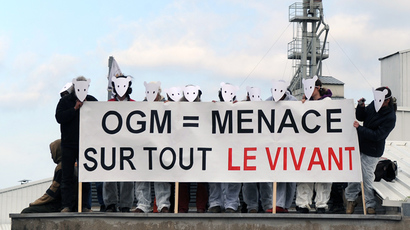Biotech lobby defeat in Europe: MEPs strengthen govt GM opt-outs

MEPs have defeated a European Commission proposal to prevent member states from banning genetically modified crops on health and/or environmental grounds.
Even if the EU approves genetically modified (GM) crops for cultivation, Tuesday’s vote now allows national bans for environmental or health reasons.
The European Food and Safety Authority approved GM for use in the EU, but a number of states opposed to GM, such as France, wanted rights to block crops under the principle of ‘subsidiarity’, or devolution to individual states.
Under previous rules, the European Commission had proposed in 2010 to let member states ban GM crops on their territory for national planning or socio- economic reasons.
But this slightly messy compromise would have allowed biotech corporations to ride roughshod over any country in the EU that didn’t want GM.
Any governments wanting to ban GM would first have been obliged to try and strike a deal with the biotech companies, in order to exclude their territory from GM cultivation. This would have allowed biotech companies to put heavy pressure on certain governments and put them at risk of costly law suits.
The compromised agreement, which was voted through by Europe’s Council of Ministers in June, was branded as a “third rate agreement” by the French parliamentarian, Corine Lepage.
“The Council's text does not give a solid judicial basis to realistically ban GMOs. It gives biotechnology companies a tremendous influence in the decision-making process,” she said in a statement at the time.
READ MORE: French law temporarily bans GM-maize planting while larger ban gains steam

But the original proposal has now been amended on the grounds of environmental and health concerns after securing the support of the European Conservatives and Reformists bloc in the European Parliament.
The new amended proposal “will leave GM cultivation firmly in the hands of national governments, who can decide for themselves, as long as the right protections are in place, whether they want to grow GM or not,” said Paul Brennan MEP, the UK Labour Party’s European spokesperson on agriculture, as quoted by the Guardian.
The new amendments will make the decisions’ of member states clearer and harder for biotech companies to challenge.
“We want to keep this issue out of the courts as companies are much more likely to challenge a member states’ decision that is unclear,” said Catherine Bearder, a Liberal Democrat MEP.
The UK Conservative Party supported the changes within the subsidiarity principle, despite the fact that the UK is a supporter of GM crops.
Julie Girling, the Conservative Party’s environment spokeswoman, said that the commission’s opt-out idea would ensure a quick, simple and legally sound solution to approving GM.
Separately, a new report published on Friday by Test Biotech, a platform of ecological scientists, said the MON810 genetically modified maize strain (the only one approved for growth in Europe), had negative health impacts on the kidneys, livers and pancreases of rats. This will provide further ammunition to the European anti-GM lobby.
READ MORE: GMO assessment has ‘failed’ at protecting public health – report














